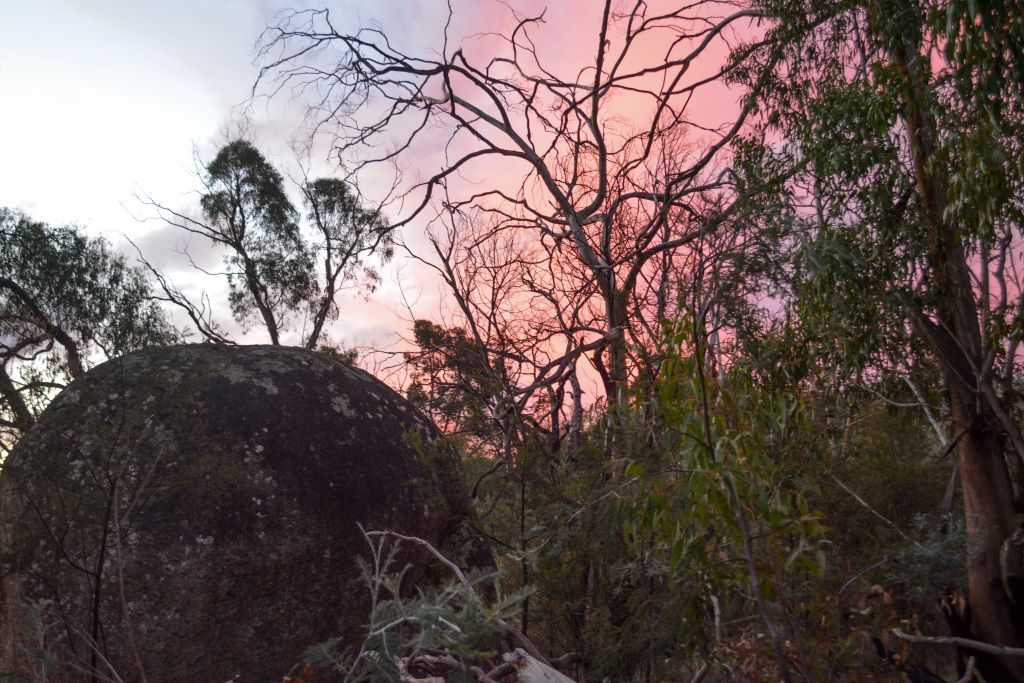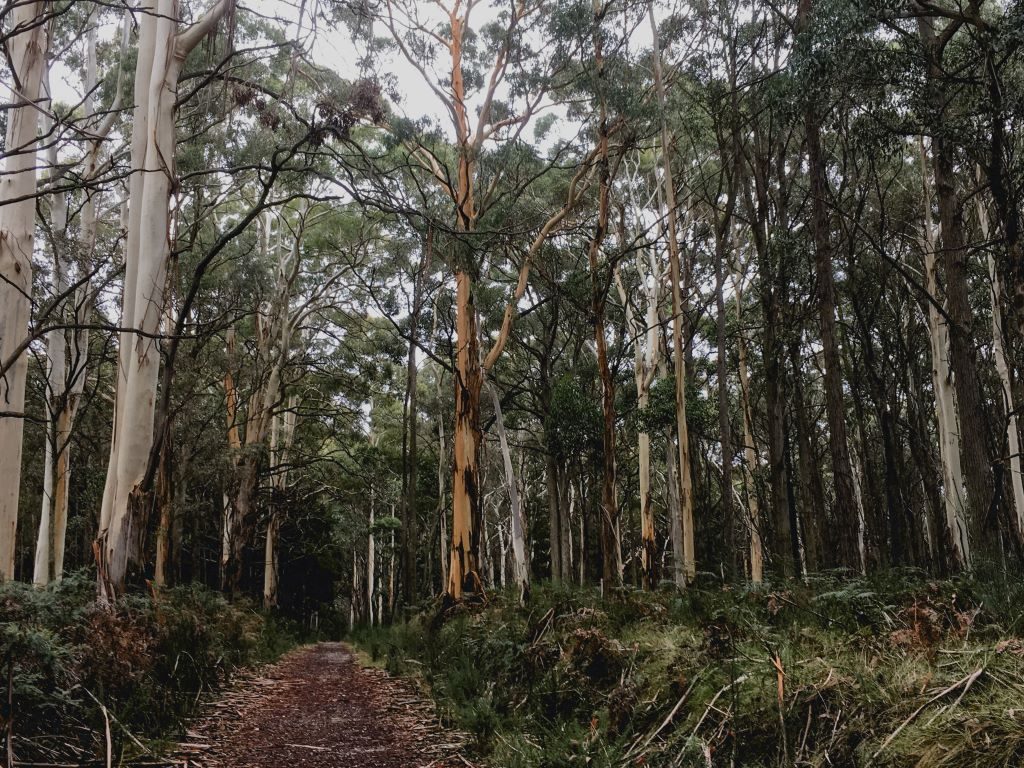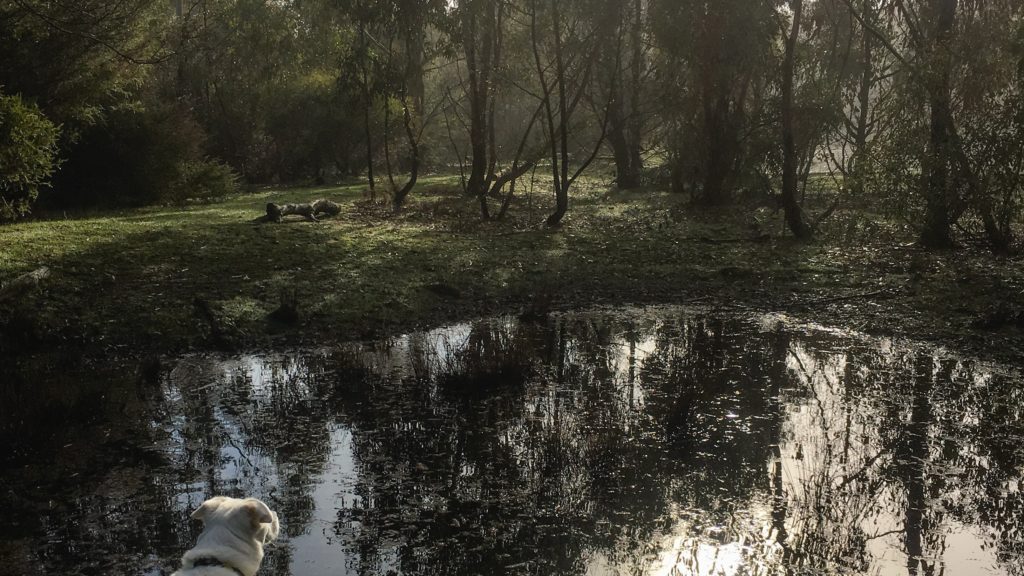It was in winter that I first fell in love with the Ranges, where I now count myself fortunate to live.
Four years ago, my partner and I, living car-less in the inner west of Melbourne, packed our bikes onto a train for a short stay in Kyneton.
Rugged up in coats and gloves, and trying to keep frozen fingers from sticking to handlebars, we rode the seven kilometres to Black Hill Reserve – now one of our favourite local walking spots. The Reserve encompasses a four-kilometre circuit with several walking tracks and a panoramic view of the Ranges from its modest peak.
Some property of this volcanic landscape seems to come alive in miserable weather – perhaps the dew on weeping leaves of eucalypts or the lichen on granite boulders, which stands out all the better against a dull sky.

To be clear, I’ve always hated the cold. All through the bitter mornings and short days of winter, I long for the sun on my skin, for balmy evenings and barbecues on the deck.
Renowned for its cool climate wines, the Macedon region in winter is a level of cold you just don’t experience in Melbourne. But with that comes appreciation: the bath I sunk into after cycling back from the Reserve four years ago still stands out in memory like being enveloped in a silken cocoon, wallowing in warm honey.
The year after our very first trip to the Ranges, we spent a weekend in Trentham, in neighbouring Hepburn Shire, where we sadly missed a glorious snowfall by a day. We donned raincoats and spent a day wandering through the Wombat State Forest, exploring tannin pools rippling with raindrops and investigating the plethora of strange and colourful fungi decorating the forest floor, tree trunks and fallen logs. There’s something magical about this damp, mossy, mushroomed forest. It feels more like the English woods of storybooks than the dry, sparse landscape we usually associate with our part of the world.

A year ago, we bought our first home in Kyneton. I’m still convincing my Melbourne friends it was not purely out of financial necessity that I chose to move here, but rather an escape I’d been planning since teenage years. Kyneton has all the cultural perks of inner Melbourne – with more than its fair share of quality eateries and watering holes, boutique shops and even its own music festival – but with the beauty and wildness of the country right on its doorstep.
I try to look at the stars every night now. Some nights I walk my dog through the construction site by the Campaspe river and lie on the unused road for a view of the sky that is unobscured by street lights. I think I’ve seen more meteors in the last year than in my whole life prior. Partly that’s the virtue of looking – but the night sky in the Ranges demands to be looked at. Our clear, frostbitten nights afford a view of the Milky Way that’s ‘light years’ (ahem) from what you see in light-polluted Melbourne. The sky is not dotted with stars, as in the city, but littered with them.
Taking a few minutes to stop, lie down and remember your place in the vastness of the cosmos can be a meditative and deeply cathartic experience. And if you happen to lose the odd finger or two in the process of marvelling at the star-laden sky, you might just about think it a price worth paying.
I thought I had seen frost in Melbourne, but I hadn’t. The first morning I woke to see the reserve out my kitchen window turned silver and glittering I ran back into the bedroom to wake my partner (who, having grown up in northern England, blinked one eye and rolled over). Several times I ventured out in the morning to find the dog’s water bowl turned to ice. Around town you see elaborate constructions of tyres, buckets, and blankets hugging exposed pipes to keep the water in liquid form. When we moved into our house in June, plants that had thrived through several Melbourne winters turned limp and died from frostbite within days.
From the train into the city on frozen mornings, low-hanging mist over Mount Macedon lends an ethereal quality to the land. I watch steam rise off fields of whitened grass as it thaws and, patch-by-patch, turns to gold in the morning sun. And for me, an escaped suburbanite, the thrill of seeing kangaroos on the way to work is yet to wear off.
It’s still a novelty to crunch crystallised grass underfoot on my walk to the train station, to watch the tiniest flecks of white powder zoom around my face as I wait on the platform. Upon moving to Kyneton, gloves entered my wardrobe as a daily accessory and a scarf was barely less of a necessity than shoes. I even discovered legitimate uses for a beanie.
Coming home from the station at night I walk, hands in pockets, with my scarf wrapped around my face, trying to leave no patch of skin to the mercy of the teething air. But when I get home from work or a weekend walk in the forest, I unravel in front of a blazing fire with a hot drink and life is pretty much perfect.

Venturing out into the bush in the midst of winter feels like discovering a hidden world. When your every instinct is telling you to seek warmth and shelter, there’s something empowering about wrapping yourself in layers and knowing you can endure.
Not only does the outdoors take on a different and wondrous feel in the cold and wet weather, but the warmth and snugness of inside is never better appreciated than in direct contrast.
I wouldn’t go so far as to suggest that I’ll ever happily wave goodbye to sun and summer air. But I no longer dread the coming of winter.
Banner image courtesy of Bronwen Cavallo


Leave a Reply